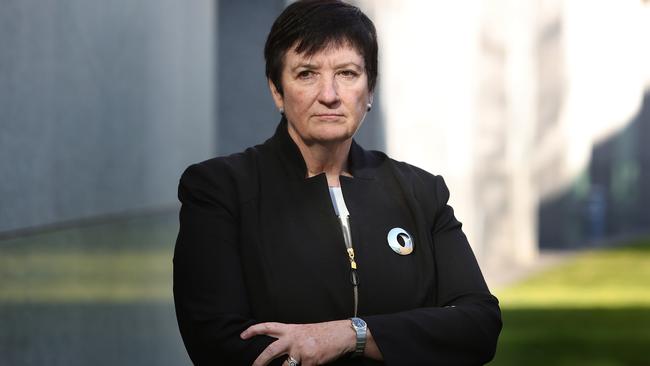Budget 2019: Lack of company tax cut biggest gripe
The lack of a company tax cut has emerged as business’s major gripe about the federal budget.

The lack of a company tax cut has emerged as business’s major gripe about a federal budget that has otherwise drawn little more than shrugs from corporate Australia.
While retailers have seized on the budget’s personal tax cuts as a potential lifeline for the struggling sector, other parts of the business community have had little to say about a budget that contained little that affected them.
The Australian Banking Association did not even issue a statement following the budget, although the budget contains more than $600 million in new money to fund financial regulators in the wake of the Hayne royal commission.
“This was an important budget to deliver the funding allocations needed for the government to deliver on the recommendations of the royal commission,” ABA chief executive Anna Bligh told The Australian.
“The industry is focused on delivering on the recommendations with a sense of resolve and urgency and will continue to work with the government to ensure lasting change.”
Experts have also cast doubt on Treasury growth forecasts underpinning budget forecasts of a return to surplus given the government is also committed to slashing skilled migration.
“I’d love to have some of what they’re smoking when they come up with those numbers,” veteran investment banker Mark Carnegie told Your Money’s Ticky program.
Business Council of Australia chief executive Jennifer Westacott continued a media blitz yesterday, descending on radio stations and TV networks to push the peak body’s message that while the budget’s projected return to surplus was welcome, moves to encourage investment — a corporate tax cut and an investment allowance — were vital.
“At some point, whoever wins government, they’ve got to face up to the fact that we have one of the highest company tax rates in the world,” Ms Westacott told Sky News.
“We’ve got now this bizarre two-tier company tax system. And meanwhile, countries all over the world are lowering their taxes.”
AI Group chief executive Innes Willox told Ticky the surpluses were “skinny”.
“Directionally it’s positive, it’s an election document as much as an economic one but at least it’s set the tone for what should be a good debate,” Mr Willox said.
He said the economy was “in a slowdown mode”.
“What we’re seeing is an imbalance occurring within the economy, with consumers, and business consumers, being more reluctant to spend,” he said.
“We do need stimulus to keep unemployment low at about 5 per cent … that’s why we give this budget a tick.”
Suncorp CEO Michael Cameron also welcomed the surplus projections but said it was “disappointing the budget didn’t recognise the need for any additional investment in disaster resilience and mitigation”, especially after a summer of bushfires, flooding, hail and cyclones.
“Disaster and climate risk must be acknowledged with funding that will strengthen the resilience of our communities, particularly those in northern Australia,” Mr Cameron said.
“We hope that during the election campaign we will see more substantial policy commitments, and a vision to build the resilience of our communities.”
MYOB boss Tim Reed said he rated the budget “very highly”.
“The personal tax cuts, while they obviously don’t go into the pockets of business, they do go into the pockets of consumers … so that is going to be helpful,” he said.
Mortgage Choice chief Susan Mitchell complained that the budget contained nothing for a housing market that, in Sydney and Melbourne, showed signs of entering freefall.
“Unfortunately, this was not the federal budget for homeowners or the property sector as no initiatives were announced that provide direct stimulus to the property market,” she said.
“That being said, policy measures which improve infrastructure can have a positive long-term impact on housing affordability.”
Stockland chief executive Mark Steinert said measures to assist with the rising cost of living such as tax relief and energy discounts would help to improve consumer sentiment.
“In a moderating residential market, these measures will help give young people more opportunities to realise the dream of home ownership,” he said. But it was “critical that banks and lending institutions, with the direct support of regulators, provide responsible access to credit to help ensure the resilience of our housing market”.
Retailers are counting on people to spend tax cuts promised in the budget, delivering a revenue boost to the struggling sector.
Australian Retailers Association executive director Russell Zimmerman said Josh Frydenberg’s plan to increase tax offsets would put cash in the hands of consumers. “Given taxpayers will have this cash as soon as July if their tax returns are complete, this represents a substantial and almost immediate boost to retail spending across the economy,” Mr Zimmerman said.
He also welcomed the reduction of the 32.5 per cent tax rate to 30 per cent from 2024 and the government’s projection of budget surpluses from next year onwards.
However, he said more information was needed about a promise to spend $525m on training.
As The Australian has reported, most of this money has previously already been pledged.
“While the ARA would like to see more detail of the ‘10 new training hubs’ announced by the Treasurer, and how they might work as far as our industry is concerned, we welcome both the commitment to apprenticeships, which retail embraces, and the $62m earmarked for literacy, numeracy and digital skills development,” Mr Zimmerman said.
Additional reporting: Damon Kitney



To join the conversation, please log in. Don't have an account? Register
Join the conversation, you are commenting as Logout